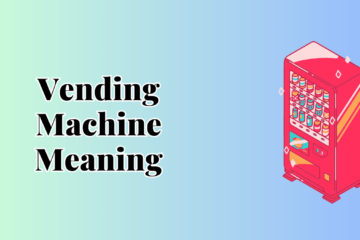So, you’re pondering whether investing in a vending machine is a smart move? Well, you’ve come to the right place! In this comprehensive guide, we will walk you through the world of vending machines and analyze whether buying one is a prudent decision. Vending machines have been a staple in various locations for decades, offering convenience and quick access to snacks, drinks, and even small essentials. However, like any business venture, there are both benefits and challenges associated with buying a vending machine.
Buying a Vending Machine ?
Before we dive into the nitty-gritty details, let’s address the big question head-on: Is buying a vending machine smart? The answer isn’t as straightforward as a simple “yes” or “no.” It depends on various factors, including your goals, financial situation, and commitment to managing the business effectively. Owning a vending machine can be a profitable endeavor if done right, but it requires careful planning and execution.
The Advantages of Owning a Vending Machine
1. Passive Income Stream
One of the primary advantages of investing in a vending machine is the potential for a passive income stream. Once the machine is installed and stocked, it can operate 24/7 without constant supervision, generating revenue even when you’re not present.
2. Flexibility in Location
Vending machines can be placed in a wide range of locations, providing the flexibility to target different demographics. From schools and offices to shopping malls and public transportation hubs, you have the freedom to choose strategic locations to maximize sales.
3. Low Operating Costs
Compared to traditional brick-and-mortar businesses, vending machines have lower operating costs. There is no need for expensive commercial space, and maintenance expenses are generally minimal, especially if you invest in modern, reliable machines.
4. Minimal Time Commitment
Once you set up the vending machine and establish a reliable supply chain for restocking, the business demands relatively little time commitment. This is particularly attractive if you have other professional or personal commitments.
5. Diverse Product Offerings
Vending machines aren’t limited to just snacks and drinks. Today, you can find machines that offer various products, including toiletries, electronics, and even hot food items, expanding your market opportunities.
6. Initial Investment
Like any business venture, owning a vending machine requires an initial investment. While it might not be as significant as starting a large-scale business, it’s essential to have sufficient funds to purchase the machine and initial inventory.
7. Competition
The vending machine industry can be competitive, especially in highly-trafficked areas. To succeed, you’ll need to differentiate your offerings, maintain competitive prices, and provide exceptional customer service.
8. Maintenance and Repairs
Though vending machines generally require minimal maintenance, malfunctions can occur. Ensuring prompt repairs and regular maintenance is crucial to keep your machine running smoothly.
9. Stock Management
Effective stock management is essential to avoid wastage and ensure your machine always offers fresh and desirable products. This requires careful monitoring and coordination with suppliers.
10. Cash Management and Security
If your vending machine accepts cash payments, you’ll need to implement robust security measures to protect against theft and vandalism.
11. Analyzing Demographics
Before investing in a vending machine, conduct thorough research on the demographics of the potential locations. Understanding the preferences and needs of your target audience will help you tailor your product offerings.
12. Identifying Profitable Products
Selecting the right products for your vending machine is critical to its success. Conduct market research to identify popular items that align with the location and target audience.
13. Negotiating with Suppliers
Building strong relationships with suppliers is crucial to securing favorable pricing and maintaining a reliable inventory flow. Negotiate prices and terms to optimize your profit margins.
14. Types of Vending Machines
There are various types of vending machines available, each catering to different product categories. Decide whether you want a snack machine, beverage machine, combo machine, or specialized vending unit.
15. New vs. Used Machines
Consider whether to invest in a new or used vending machine. While new machines offer the latest technology and reliability, used machines might be more budget-friendly, making them a viable option for beginners.
16. Features and Technology
Modern vending machines come with advanced features, such as cashless payment options, touchscreen interfaces, and real-time inventory tracking. Assess the technology that aligns with your business goals and customer expectations.
17. Legal and Regulatory Requirements
Ensure you meet all the necessary legal and regulatory requirements to operate a vending machine business. This includes obtaining licenses, permits, and complying with health and safety standards.
18. Location Agreements
Negotiate location agreements with property owners or managers to secure suitable spaces for your vending machines. Clearly define the terms and conditions to avoid potential conflicts in the future.
19. Marketing and Promotion
Create a marketing strategy to promote your vending machine business. Utilize social media, local advertising, and promotions to attract customers to your machines.
20. Maintenance and Repairs
Establish a routine maintenance schedule to keep your vending machines in optimal condition. Address any issues promptly to avoid inconveniencing customers.
21. Customer Service
Offer excellent customer service by promptly addressing customer inquiries and concerns. A positive experience can lead to loyal customers and word-of-mouth referrals.
FAQs
- Can I start a vending machine business with a limited budget?
Yes, it’s possible to start small with a single machine and gradually expand your business as you generate profits. - What are the most profitable products to stock in vending machines?
Popular choices include snacks, beverages, and healthy options like granola bars and bottled water. - How do I find ideal locations for my vending machines?
Conduct thorough research on high-traffic areas with the right target audience, such as offices, schools, and gyms. - Are there any special licenses required to operate vending machines?
Licensing requirements vary by location, so check with local authorities to ensure compliance. - Can vending machines be eco-friendly?
Yes, opt for energy-efficient machines and consider offering recycling options for customers. - Is it necessary to restock my vending machines daily?
The frequency of restocking depends on the machine’s size, location, and product demand. Regular monitoring will help you determine the optimal schedule.
Conclusion
Buying a vending machine business can be a smart decision if you approach it with thorough research, strategic planning, and dedication. The advantages of passive income, flexibility in location, and low operating costs can make it a rewarding venture. However, it’s essential to consider the potential challenges and risks and take proactive steps to address them



